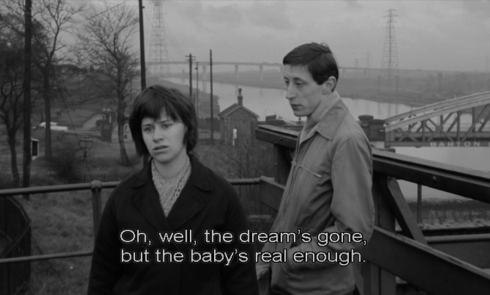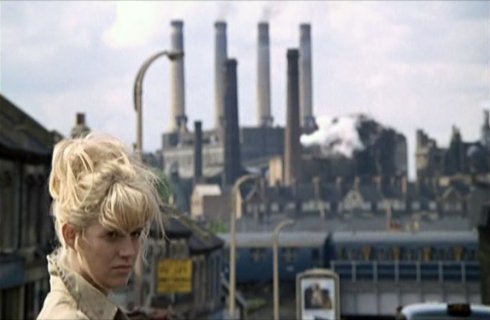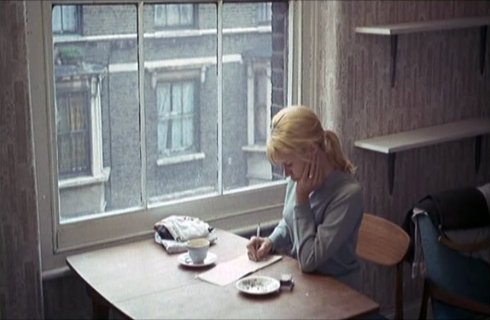I love the 1960s. And I think you already know that. I love Syd Barrett, early Pink Floyd and psychedelia in London, I love Twiggy’s doll-like make up, I love Jean-Luc Godard’s Nouvelle Vague films, especially those starring Anna Karina, I love listening to young, sweet and innocent Marianne Faithfull singing ‘Come and Stay With Me’ or ‘As Tears Go By’, I love watching films with gorgeous Brigitte Bardot, I love listening to Jim Morrisson singing about L.A. – the city of light, I love looking at pictures of Jean Shrimpton shot by David Bailey, I love the student’s protests in Paris and Jane Birkin and Serge singing together, I love the mini dress. But I also love the other side of the sixties, not so glamorous and swinging aspect of the decade, I love the kitchen sink realism.
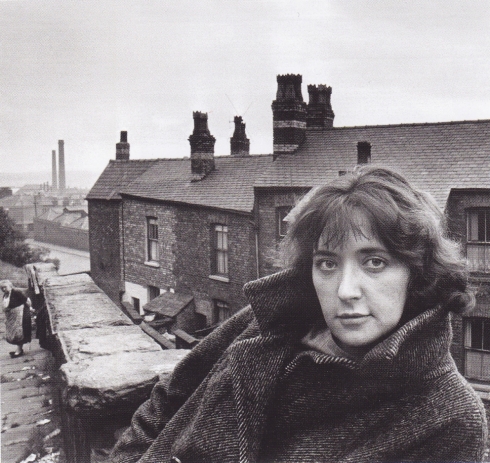 Shelagh Delaney, by Arnold Newman, 1961
Shelagh Delaney, by Arnold Newman, 1961
Kitchen sink realism or kitchen sink drama is a cultural movement that manifested itself in films, theatre, art and television plays. It’s characteristic for late 1950s and early 1960s, but because the themes are so universal the term can be applied to artworks and films of later date, for example, Ken Loach’s film Looks and Smiles (1981) has all the characteristics of a kitchen sink drama but was made in the eighties. Also, an earlier film A Tree Grows in Brooklyn (1945) resembles kitchen sink realism very much, it deals with poverty and limited education opportunities for lower classes seen through the prism of a working class Irish-immigrant family in Brooklyn. In a way, kitchen sink realism is an aesthetic, and not just a movement.
Typical kitchen sink drama characters are working class lads and girls who all want something more and better of life, although they often can’t define just what is it they long for, live in the North of England or the Midlands in council houses, or grim attic apartments. They are young, intelligent and often good looking, but their social background, along with a string of bad decisions makes them trapped in lives of resignation, bitterness and disillusionment.
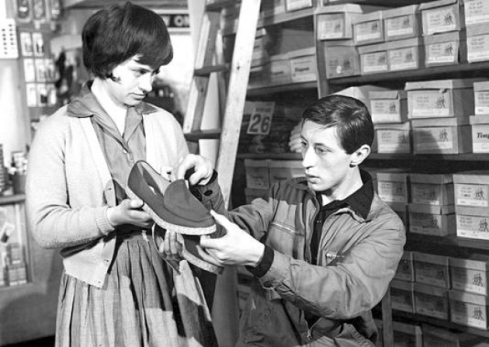 A Taste of Honey, 1961, with Rita Tushingham and Murray Melvin
A Taste of Honey, 1961, with Rita Tushingham and Murray Melvin
Jo from ‘A Taste of Honey (1961)’ is a fifteen year old schoolgirl who falls in love with a black sailor and gets pregnant, in ‘Room at the Top (1959)‘ a working class lad Joe has to decide between living with a woman he truly loves or marrying a pretty young middle class girl which will land him a great job, in ‘Poor Cow (1967)‘ Joy lives with an abusive husband who ends up in jail and has to take care of a small son while still craving beauty, romance and pleasure, in ‘Up the Junction (1965)’ Rube, a young girl working in a confectionery factory, gets pregnant and goes through a traumatic illegal abortion because that’s the only option, In ‘Look Back in Anger (1959)‘ dissatisfied Jimmy Carter, played by Richard Burton, has a sweet-stall in the market, plays trumpet and lives with a passive middle class wife Allison, in ‘The L-Shaped Room (1962)‘ Jane is pregnant and doesn’t want to marry the father, Cathy Come Home (1966) deals with the subject of homelessness.As you can see, every character has a deep inner turmoil and usually ends up unable to fight back the cruel reality.
Their ideals are unattainable, they are in the gutter but they are trying to look at the stars – but there’s none to be seen on that dark, bleak sky of the industrial north. What they want they cannot reach, and if they do get what they want- there’s usually a nasty price to be paid. Was it worth it, they all ask themselves after the taste of honey has vanished from their lips.
 Shelagh Delaney, by Arnold Newman, 1961
Shelagh Delaney, by Arnold Newman, 1961
It would be impossible to write this post without mentioning Morrissey and The Smiths; it was because of Morrissey that I was introduced to Shelagh Delaney’s play A Taste of Honey, and then the movement itself. Perhaps the reason I loved it so much lies in the fact that I love Morrissey’ lyrics, which often deal with similar subjects as the kitchen sink dramas; ‘small-town frustration, lost dreams and complicated loves’ (Why Pamper Life’s Complexities? Essay on The Smiths).
This quote from the book already mentioned above illustrates the connection between kitchen sink dramas and Morrissey’s lyrics:
‘Kitchen-sink characters such as Jo from ‘A Taste of Honey’, Arthur from ‘Saturday Night Sunday Morning’, Billy from ‘Billy Liar’ and Colin from ‘The Loneliness of a Long Distance Runner’ are denied access to the ‘honey’ for most of their lives. Their moment of enlightenment – ‘the taste of honey’ in their lives – is ephemeral and comes under the risk of punishment. This essential dreamless quality of kitchen-sink world can found at the heart of many of Morrissey’s lyrics, and he himself was seen during his years with The Smiths as the official voice of gauche and disillusioned youth.‘
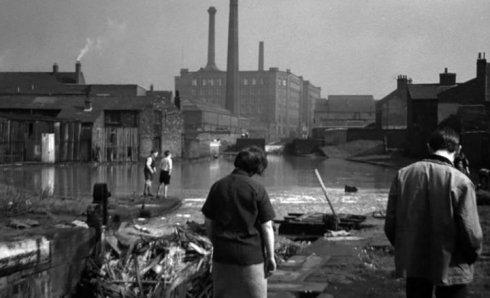 A Taste of Honey (1961) with Rita Tushingham and Murray Melvin
A Taste of Honey (1961) with Rita Tushingham and Murray Melvin
Morrissey’s lyrics go hand in hand with bleak aesthetic of the North; smoke rising from the chimneys, small flats with wallpapers peeling off, endless row of red-bricked houses which all look the same just like the days which linger on bringing nothing but dullness. He articulated provincial boredom and feeling of alienation from everyone around him very well. His lyrics create poetic images that seemed to have arisen not only from his own experience of loneliness and life in the north, but also from kitchen sink dramas he loved and often borrowed lyrics from. He sang of kissing under the iron bridge, coming back to the old house (which he never will because it was demolished like a lot of houses in Manchester at the time), short-lasting loves; shyness that is criminally vulgar; going to clubs, standing alone going home alone and wanting to die.
 A Taste of Honey (1961) with Rita Tushingham and Murray Melvin; “This place stinks. That river, it’s the colour of lead.” (says Jo in Act II)
A Taste of Honey (1961) with Rita Tushingham and Murray Melvin; “This place stinks. That river, it’s the colour of lead.” (says Jo in Act II)
One song in particular, This Night Has Opened My Eyes, deals with kitchen-sink theme directly. Morrissey took inspiration from Shelagh Delaney’s play ‘A Taste of Honey’. In his other song ‘Reel Around the Fountain’ he even incorporated a line from the play that goes ‘I dreamt about you last night, I fell of my bed twice.’
And I will never sleep again
You kicked and cried like a bullied child
A grown man of twenty-five
But he didn’t and he never will
Oh, save your life
Because you’ve only got one
But the baby is real
Oh, you did a good thing
She could have been a poet
Oh, you did a bad thing
And I’m not happy
And I’m not sad“
 Carol White in Poor Cow (1967), dir. Ken Loach
Carol White in Poor Cow (1967), dir. Ken Loach
Shelagh Delaney, who wrote ‘A Taste of Honey’ when she was just eighteen years old, describes the kitchen-sink aesthetic very well in a short TV report for BBC Four in 1960. What struck me is that she loved living in Salford, and admitted she gets very homesick whenever she’s away from it. This is ironic because most of kitchen-sink characters are dying to get out of their provincial towns, but Delaney loved the atmosphere of the place, she loved the vitality of people, the language and the situations were all wellsprings of inspiration. She said: ‘And the language is alive, its viral, it lives and it breathes and you know exactly where’s it’s coming from, right out of the earth.‘
Delaney also called Salford a drug, explaining that even if you wanted to leave, the place hold you back and it’s impossible to say goodbye to it.
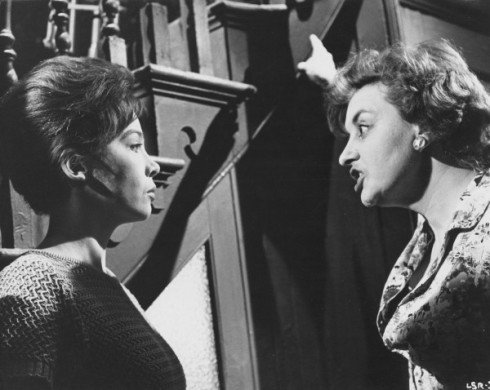 The L-Shaped Room (1962) with Leslie Caron
The L-Shaped Room (1962) with Leslie Caron
Before I sat down writing this post, I asked myself what is it exactly that I love about kitchen sink dramas. And I can’t really pin-point one particular thing, it was love at first sight I suppose. First of all, I love that it’s about the real people in real situations. I don’t like sugar-coated things, they only make you detest your own life and poison you with desires and daydreams about things that will never happen, at least not for you. But kitchen sink dramas are as real as Dostoyevsky’s novels. Characters are always faced with difficult decisions, live in a place they want to escape from, and there’s always a sense that what they want will cause their downfall. What started as ‘just a kiss’ could and probably will end up in pregnancy because characters such as Jo in A Taste of Honey, Rube in Up the Junction and Jane in The L-Shaped Room have no luck when it comes to the matters. And men are working class heroes and that’s something to be. They usually deal with limited employment opportunities, hard labour in factories and difficulty in reconciling their responsibilities and desires, along with the disdain they feel from the upper classes when they try to ‘invade’ their territory.
Watching them, and observing how they deal with these very difficult situations and decisions acts as a catharsis for me, in a way that Aristotle described it as ‘purification of emotions through art’. He thought that art (in this case film) ought to evoke feelings of compassion and fear and thereby purify the feelings of the viewer. Kitchen sink dramas definitely do that for me. When I think of Jo being pregnant with a ‘grown man of 25 who said he’d cure her ills but he didn’t and he never will’, or those girls in ‘Up the Junction’ working in a factory, living for the weekend to go out, put that eyeliner on and dance to some whimsical tunes, or Allison deciding whether she’ll stay with Jimmy or not – these situations make all my problems seem trivial, and I end up crying for them because their lives are so helpless and I don’t know what I’d do in their situations.
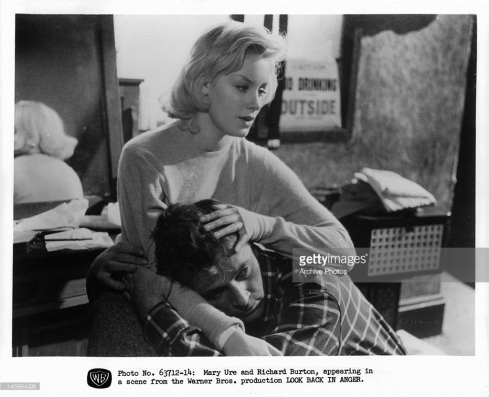 Look Back in Anger (1959) with Mary Ure and Richard Burton
Look Back in Anger (1959) with Mary Ure and Richard Burton
I also like the aesthetic of these kitchen sink dramas; everything is dark, rainy and cold, people seem to live on tea and toast, women walk around wearing petticoats and skirts all day long with their hair made for the week, children play on streets and clothes hang on the washing line, while the landscape always seems dominated by tall chimneys of factories, and red bricked houses go on and on, and people walk in the small alleyways clutching umbrellas and wondering when will that day come they’ll finally escape from their shitty town, and there’s not a single tree in the sight. And still, markets are lively, and people smile. Children play and young couples kiss. Hope lies beyond everything.
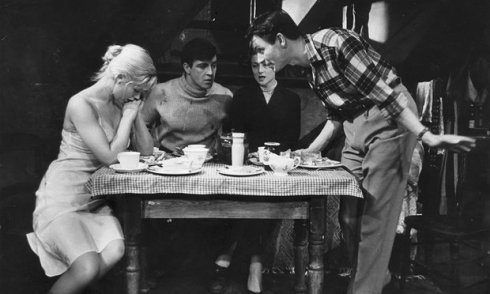 Kenneth Haigh (right) as Jimmy Porter, with Helena Hughes, Alan Bates and Mary Ure in the original production of Look Back in Anger at the Royal Court in London in 1956. Photograph: Charles Hewitt (source)
Kenneth Haigh (right) as Jimmy Porter, with Helena Hughes, Alan Bates and Mary Ure in the original production of Look Back in Anger at the Royal Court in London in 1956. Photograph: Charles Hewitt (source)
In this post I wanted to show you that, while the sixties are mostly loved and remembered for their swinging and glamorous qualities, there’s also a ‘darker’ side to them. Kitchen sink dramas deal with social and economic problems of post-war Britain shown through the psychological portrayal of an individual – it’s up to you to embrace their dark charms.
Now I’ll recommend you films that were my personal favourites: A Taste of Honey (1961), Poor Cow (1967), Look Back in Anger (1959), The L-Shaped Room (1962), Alfie (1966), and some of later date by Ken Loach: Kes (1969) and Looks and Smiles (1981). Mike Leigh seems to nurture a similar aesthetic in some of him films, although they are noticeably less grim, but I love them as well, particularly Naked (1993), Life is Sweet (1990) and All or Nothing (2002).
Do you like the aesthetic and themes of kitchen sink dramas?

